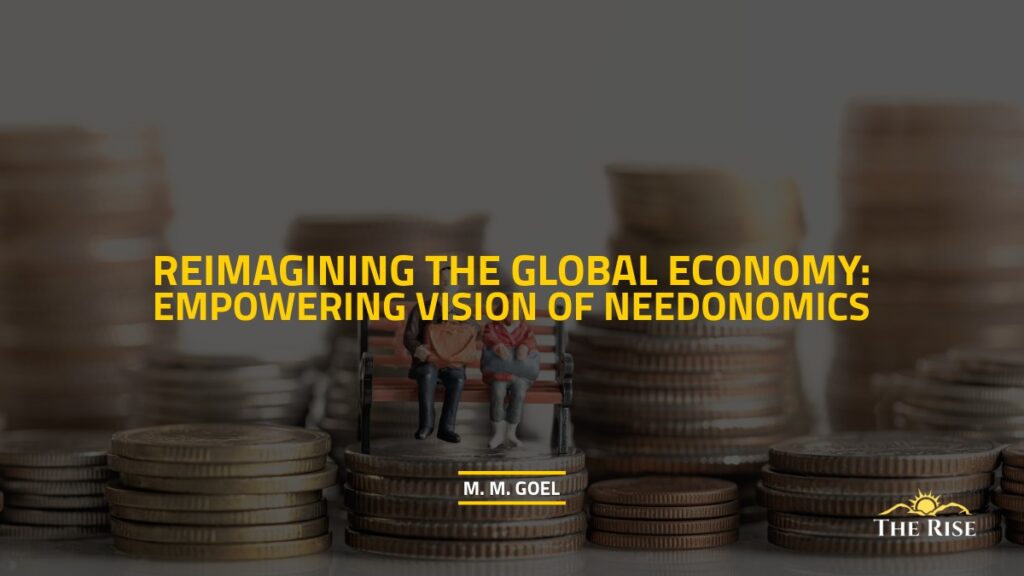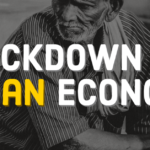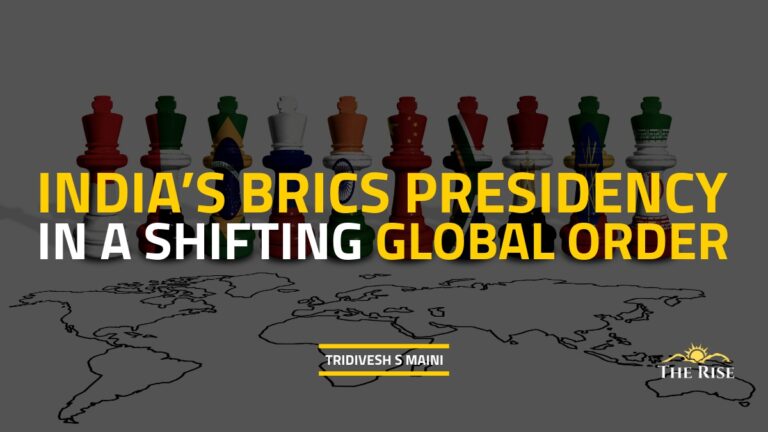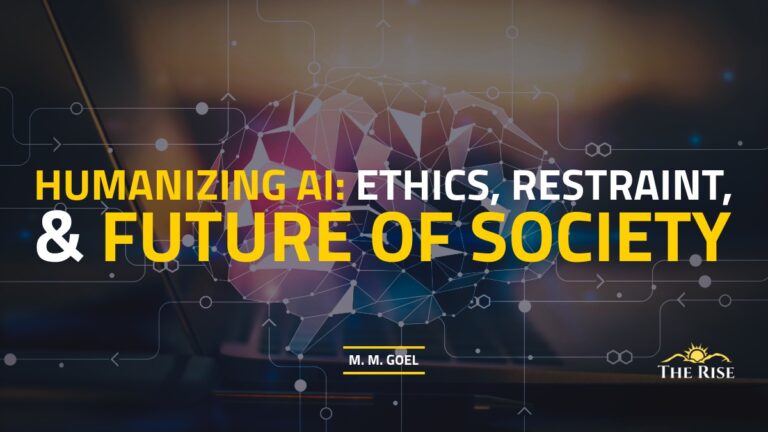Needonomics thus transforms empowerment from being privilege-based to being responsibility-based. It offers a practical yet profound path to empowerment, urging us to overcome greed, manage debt, and promote inclusivity. More than an economic philosophy, it is a journey of human consciousness—from tradition to modernity, from excess to balance, from selfishness to service.
In today’s turbulent global economy, characterized by widening inequalities, unsustainable consumption, and the unending pursuit of greed, the search for an alternative philosophy has become inevitable. The capitalist obsession with accumulation and the socialist emphasis on redistribution have both failed to address the fundamental question of how much is enough. In this vacuum emerges Needonomics—a philosophy deeply rooted in Indian ethos yet universally relevant, offering a path from tradition to modernity.
Needonomics School of Thought (NST), propounded by Prof. Madan Mohan Goel, is not just an academic framework but a pragmatic way of life. It advocates a needo-lifestyle—a value system that emphasizes meeting genuine needs rather than being trapped in the endless cycle of wants. For stakeholders of the global economy—governments, businesses, civil society, and individuals—adopting Needonomics can become a source of empowerment, confidence, and sustainable contribution to society. This article explores how Needonomics represents an innovative approach to overcoming greed, managing debt, promoting inclusivity, and fostering global leadership with a humane vision.
From Greed to Need: Core of Needonomics
One of the most pressing challenges humanity faces today is the unchecked growth of greed. Consumerist culture has normalized desires beyond necessity, leading to the exploitation of natural resources, the accumulation of unsustainable debt, and social alienation. Greed has become an addiction disguised as ambition.
Needonomics challenges this paradigm. It calls upon individuals and institutions to embrace self-restraint, guided by the principle of “need, not greed.” Unlike ascetic traditions that glorify renunciation, Needonomics does not advocate rejection of material comforts. Instead, it seeks consumption within limits, where needs are prioritized, and wants are critically examined.
Also Read: From Debt to Dignity: Needonomics as Financial Therapy for the Middle Class
The shift from greed to need is not just economic, but also moral and psychological. It liberates stakeholders from the vicious cycle of endless expectations and disappointments. At its core, Needonomics redefines prosperity: true richness lies not in having more, but in needing no more.
Tradition to Modernity: Journey of Needonomics
Needonomics represents an intellectual and practical journey from tradition to modernity. It draws inspiration from the Bhagavad Gita, Gandhian philosophy of trusteeship, and the Indian cultural ethos of simplicity and balance. Yet, it does not remain confined to the past. Instead, it adapts these timeless principles to address the challenges of modern globalization, technology, and interdependence.
In tradition, we find wisdom: contentment, cooperation, and sustainability. In modernity, we find innovation: scientific progress, efficiency, and growth. Needonomics combines the two by urging societies to adopt technology and modern institutions without losing sight of ethical boundaries. For instance, artificial intelligence, biotechnology, and digital finance can all serve humanity effectively if governed by the principles of need rather than greed.
Also Read: From Farm to Fork: A Needonomics Blueprint for Food Quality in Nutritious Bharat
Thus, Needonomics serves as a bridge between cultural heritage and economic modernity, enabling stakeholders to progress without losing their moral compass.
Innovation for Debt-free and Sustainable Futures
One of the core promises of NST is its emphasis on overcoming debt. Debt has become the silent epidemic of modern economies, burdening governments, businesses, and households alike. Nations are trapped in cycles of borrowing that erode sovereignty, while individuals struggle with consumer loans driven more by lifestyle inflation than genuine needs.
Needonomics offers a corrective mindset. By prioritizing needs, it curbs wasteful expenditure and enables better resource allocation. At the institutional level, this philosophy promotes responsible fiscal policies, transparency, and ethical business practices. At the individual level, it encourages financial discipline and investment in human well-being rather than conspicuous consumption.
Moreover, Needonomics sows the seeds of sustainability. It naturally aligns with global sustainable development goals (SDGs), especially responsible consumption and production, climate action, and reduced inequalities. By shifting priorities from profit maximization to value maximization, NST lays the foundation for an economy that thrives without exhausting the natural resources and mortgaging the future of generations to come.
Inclusive Leadership with a Global Outlook
The success of Needonomics depends on the emergence of inclusive leadership that transcends narrow self-interest. Leadership today often swings between populism and elitism, leaving little room for balance. Inclusive leadership, as mandated by NST, is about empowering stakeholders across levels—workers, consumers, producers, and governments—by ensuring fairness, participation, and accountability.
Such leadership must be local in action but global in vision. A leader guided by Needonomics does not see sustainability as charity but as responsibility. He or she is committed to “giving back to society,” not as an afterthought through corporate social responsibility programs, but as an integral part of decision-making.
At the global level, inclusive leadership under Needonomics can reimagine economic cooperation. International institutions like the WTO, IMF, and World Bank, often criticized for serving the powerful, can adopt the principles of Needonomics to ensure fairness and justice in global trade and finance.
Vision of NST: Promoting a Needo-lifestyle
The ultimate vision of the Needonomics School of Thought is to promote a needo-lifestyle—a way of living that is globally relevant yet deeply rooted in Indian creativity and innovation.
The needo-lifestyle is not about deprivation but about conscious choices. It emphasizes:
- Sufficiency over excess: Choosing enough rather than more.
- Sustainability over exploitation: Using resources responsibly.
- Well-being over wealth: Measuring success in terms of health, peace, and happiness.
- Service over selfishness: Viewing life as an opportunity to contribute.
India, with its civilizational wisdom and youthful demographic dividend, is well-placed to lead this lifestyle. Yet, the relevance of Needonomics goes far beyond national borders. From the consumer-driven societies of the West to the emerging economies of Asia and Africa, this philosophy offers a universal roadmap to reduce stress, foster equity, and restore harmony between humanity and nature.
Empowerment through Needonomics
At its core, NST is about empowerment —reshaping economic goals and personal aspirations so that stakeholders can contribute more meaningfully to society.
- For individuals, empowerment comes from liberation—freedom from unnecessary competition, debt traps, and status anxiety.
- For businesses, empowerment lies in building trust, focusing on long-term value, and nurturing innovation guided by ethics.
- For governments, empowerment means policy-making that ensures equity, sustainability, and justice, rather than catering to short-term populism.
- For society, empowerment manifests as harmony, where collective well-being becomes the yardstick of progress.
Needonomics thus transforms empowerment from being privilege-based to being responsibility-based. It creates confident stakeholders who are not just consumers and producers but custodians of a shared future.
To reimagine the global economy, stakeholders must embrace the philosophy of Needonomics. It offers a practical yet profound path to empowerment, urging us to overcome greed, manage debt, and promote inclusivity. More than an economic philosophy, it is a journey of human consciousness—from tradition to modernity, from excess to balance, from selfishness to service.
Needonomics School of Thought envisions a world where stakeholders adopt a needo-lifestyle—globally relevant, locally rooted, and spiritually enriched. Such a lifestyle is not a utopia but a necessity if humanity is to survive and thrive in the twenty-first century. By choosing Needonomics, we not only empower ourselves but also contribute meaningfully to society, creating a future that is sustainable, just, and humane.
Disclaimer: The views expressed in this article are of the author solely. TheRise.co.in neither endorses nor is responsible for them. Reproducing this content without permission is prohibited.
About the author
Prof. Madan Mohan Goel, Former Vice Chancellor and Propounder of Needonomics School of Thought.






































Pingback: Graceful Aging in Needonomics Life-Style - TheRise.co.in